
Introduction
PulseNet Asia Pacific (PNAP), established in 2002 as a regional arm of PulseNet International (PNI), is a network of laboratories involved in the surveillance and outbreak detection of enteric bacterial pathogens. The network strives to strengthen surveillance and outbreak response through capacity building, communication and data sharing, workforce development and ensuring equitable access to genomic technology in the region. In recent years, PNAP has transitioned to the use of whole genome sequencing (WGS) as its main laboratory tool for enteric surveillance moving on from Pulsed Field Gel Electrophoresis (PFGE).
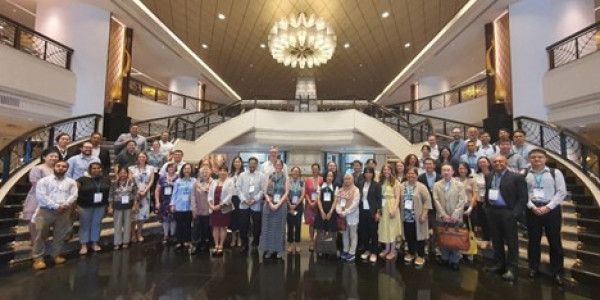
PulseNet Asia Pacific All Partners Meeting in Bangkok, October 31st - November 3rd 2023
PulseNet Asia Pacific Members
In 2022, Professor Ben Howden and Tuyet Hoang, affiliated with the Centre for Pathogen Genomics (CPG) and the Microbiological Diagnostic Unit Public Health Laboratory (MDU PHL), were appointed as Coordinators of PulseNet Asia Pacific. This appointment coincided with PulseNet International’s initiative to implementwhole genome sequencing (WGS) for outbreak investigation and surveillance in the Asia-Pacific region.
Current PulseNet Asia Pacific participants:
|
Country |
Representatives (Organisation) |
Representation (Member; Steering Committee member; Coordinator) |
|
Australia |
Centre for Pathogen Genomics (CPG) |
Coordinator; Steering Committee Member, Member |
|
Bangladesh |
International Centre for Diarrhoeal Disease Research, Bangladesh (icddr,b) |
Steering Committee Member; Member |
|
Bhutan |
Royal Centre for Disease Control |
Member |
|
Cambodia |
Laboratory of Environment & Food Safety (LEFS) |
Member |
|
China |
|
Member (Legacy) |
|
Fiji |
Fiji Centre for Communicable Disease Control, Mataika House (FCDC) |
Member |
|
Hong Kong |
|
Previous Coordinator |
|
India |
|
Member (Legacy) |
|
Japan |
National Institute of Infectious Diseases (NIID) |
Steering Committee Member; Member |
|
Malaysia |
Institute for Medical Research (IMR) |
Steering Committee Member; Member |
|
New Zealand |
The Institute of Environmental Science and Research (ESR) |
Member |
|
Pakistan |
Department of Parasitology, University of Veterinary & Animal Sciences |
Member |
|
Philippines |
Research Institute for Tropical Medicine |
Member |
|
Singapore |
National Public Health Laboratory |
Member |
|
South Korea |
Korea Disease Control and Prevention Agency |
Member |
|
Sri Lanka |
Medical Research Institute |
Steering Committee Member; Member |
|
Taiwan |
Centers for Disease Control |
Steering Committee Member; Member |
|
Thailand |
Training Centre for Excellence in Medical Sciences (TEMs DMSc) Centers for Disease Control and Prevention National Institute of Health Armed Forces Research Institute of Medical Sciences |
Steering Committee Member; Member |
|
Timor Leste |
Laboratorio Nacional de Saude |
Member |
|
Vietnam |
National Institute of Hygiene & Epidemiology Pasteur Institute |
Member |
Goal & Objectives
The goal of PNAP is to facilitate a regionally connected network of national laboratories and Ministries of Health to strengthen enteric pathogen surveillance and outbreak response in the Asia-Pacific region.
Objectives of PNAP include:
PNAP aims to hold All Partners meetings once every two years to review and drive progress of activities, gain feedback from members, and to strengthen collaboration amongst the network. The first meeting was held in Bangkok from October 31st to November 3rd.
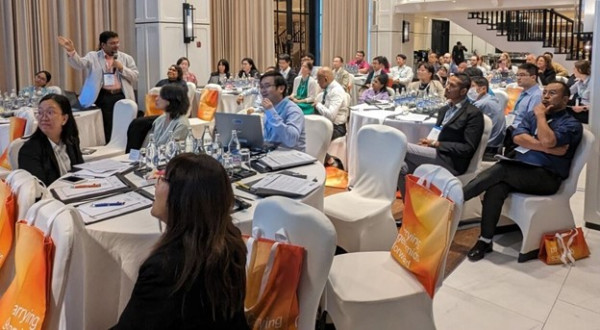
PulseNet Asia Pacific All Partners Meeting in Bangkok, October 31st - November 3rd 2023
Steering Committee
A Steering Committee was established to guide PNAP initiatives. The group includes:
The Steering Group will meet quarterly to:
Feasibility Study & Capacity Building
The goal of the PNAP Feasibility Study is to determine the feasibility and encourage the development of genomics informed capacity for enteric bacterial and antimicrobial surveillance in the Asia Pacific region.
Objectives of the study are to:
Participating sites were selected based on a needs assessment survey that assessed the following:
Each site was provided with training in wet and dry lab methods for Illumina sequencing and analysis to ensure protocol harmonisation in the region. Sites were provided with reagent support to sequence 100 enteric isolates over the course of the year.
At the conclusion of the study sites are expected to:
PNAP is actively working on capacity building and training initiatives to support the adoption of WGS in the region.
Workforce Development
The team at CPG and MDU PHL collaborate closely with APHL, PNI and member laboratories to provide guidance and expertise in pathogen genomics for public health. Areas of expertise include enteric disease, genomic sequencing, bioinformatics and genomic epidemiology.
An image library of our training activities can be found here.
2023 Illumina Feasibility Study Training Cohort 1
Illumina sequencing training was held at the Peter Doherty Institute for Infection and Immunity (Doherty Institute) in Melbourne. Training was attended by a total of 13 trainees with representatives from each feasibility site (Malaysia, New Zealand, Philippines, Taiwan and Thailand). The program ran for seven days and consisted of hands-on training in Illumina library preparation, sequencing on the MiSeq, and data analysis on the Terra.bio platform. Training was led by The Centre and MDU PHL with contributions from PNI, APHL and Theiagen Genomics.
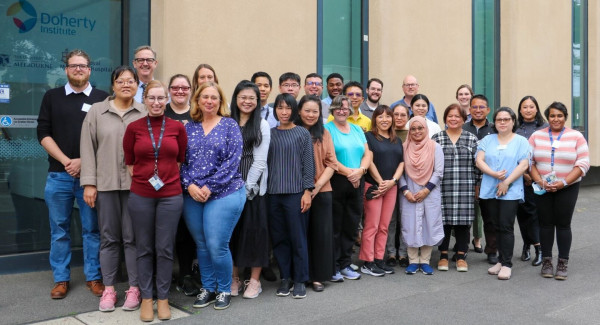
PulseNet Asia Pacific Feasibility Study Training (Cohort 1) at the Doherty Institute in Melbourne, February 1st - 8th 2023
2023 All Partners Meeting Training
A two and a half day training program was delivered at the Training Centre for Excellence in Medical Sciences (TEMS DMSc) as part of the All Partners meeting. Training was attended by 29 participants from 16 countries. Training focused on sequencing theory, hands on bioinformatics analysis on the Galaxy platform and hands on genomic epidemiology analysis on MicroReact. Training was jointly funded by WHO SEARO and APHL and was co-led by CPG, MDU PHL, PNI and APHL with contributions from TEMS DMSc and Theiagen Genomics.

PulseNet Asia Pacific All Partners Training at TEMS DMSc, October 31st - November 3rd 2023
2024 Illumina Feasibility Study Training Cohort 2
A second round of Illumina sequencing training was held at the Doherty Institute in Melbourne. Training was attended by a total of 12 trainees with representatives from each feasibility site (Bangladesh, Japan, Sri Lanka, Vietnam). The program ran for seven days and consisted of hands-on training in Illumina library preparation, sequencing on the MiSeq, and data analysis on the Terra.bio platform with an introduction to genomic epidemiology concepts. Training was led by CPG and MDU PHL with contributions from PNI, APHL and Theiagen Genomics.
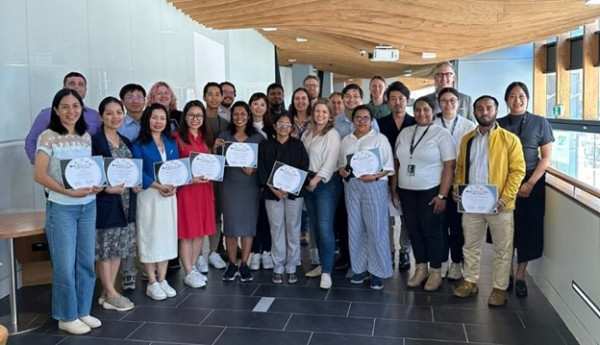
PulseNet Asia Pacific Feasibility Study Training (Cohort 2) at the Doherty Institute in Melbourne, January 31st - February 8th 2024
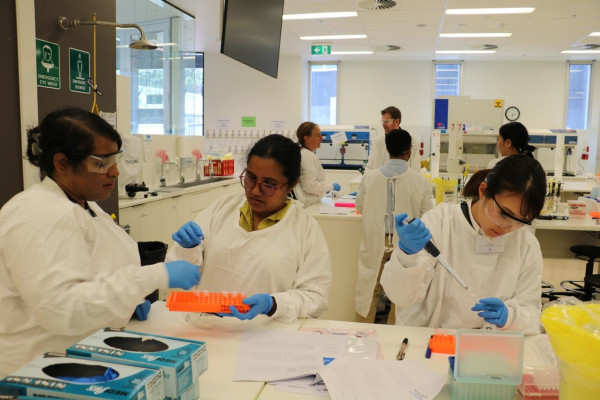
Pictured: Representatives from Australia, Sri Lanka and Japan participating in the PulseNet Asia Pacific Feasibility Study Training
2024 ONT Feasibility Study Training
The upcoming ONT training will be held at TEMS DMSc in Bangkok. It wll be attended by 32 participants from 12 different countries. Representatives from Fiji, Timor Leste and both Feasibility Study cohorts will attend. The training program will involve hands-on wet lab training in ONT rapid library preparation, sequencing on the MinION platform, and bioinformatic analysis on the Terra.bio platform.
Quality Assurance
PNAP participates in a quality assurance program (QAP) developed by PNI. This involves initial wet lab certification followed by a yearly proficiency testing (PT) program.
Wet Lab Certification
Initial certification must be completed by any individual generating data for submission to the PulseNet database. Individuals must sequence 5 ATCC strains provided to them (Campylobacter jejuni strain ATCC-33560, Escherichia coli strain ATCC-25922, Listeria monocytogenes strain ATCC-BAA679, Salmonella enterica sp. enterica serovar Typhimurium strain ATCC-51812, Vibrio parahaemolyticus strain ATCC-17802). To pass certification specific QC metrics must be met. Assessed metrics include average quality, average coverage, genus/species/serotype identification, average read length, secondary species abundance, number of high-quality single nucleotide polymorphisms compared to the reference, and assembled genome size.
A laboratory is considered certified as long as at least one individual in the laboratory has passed
Dry lab certification has not yet been implemented in the region.
Proficiency Testing
Annual proficiency testing is being rolled out across PNAP in 2024.
Last modified: